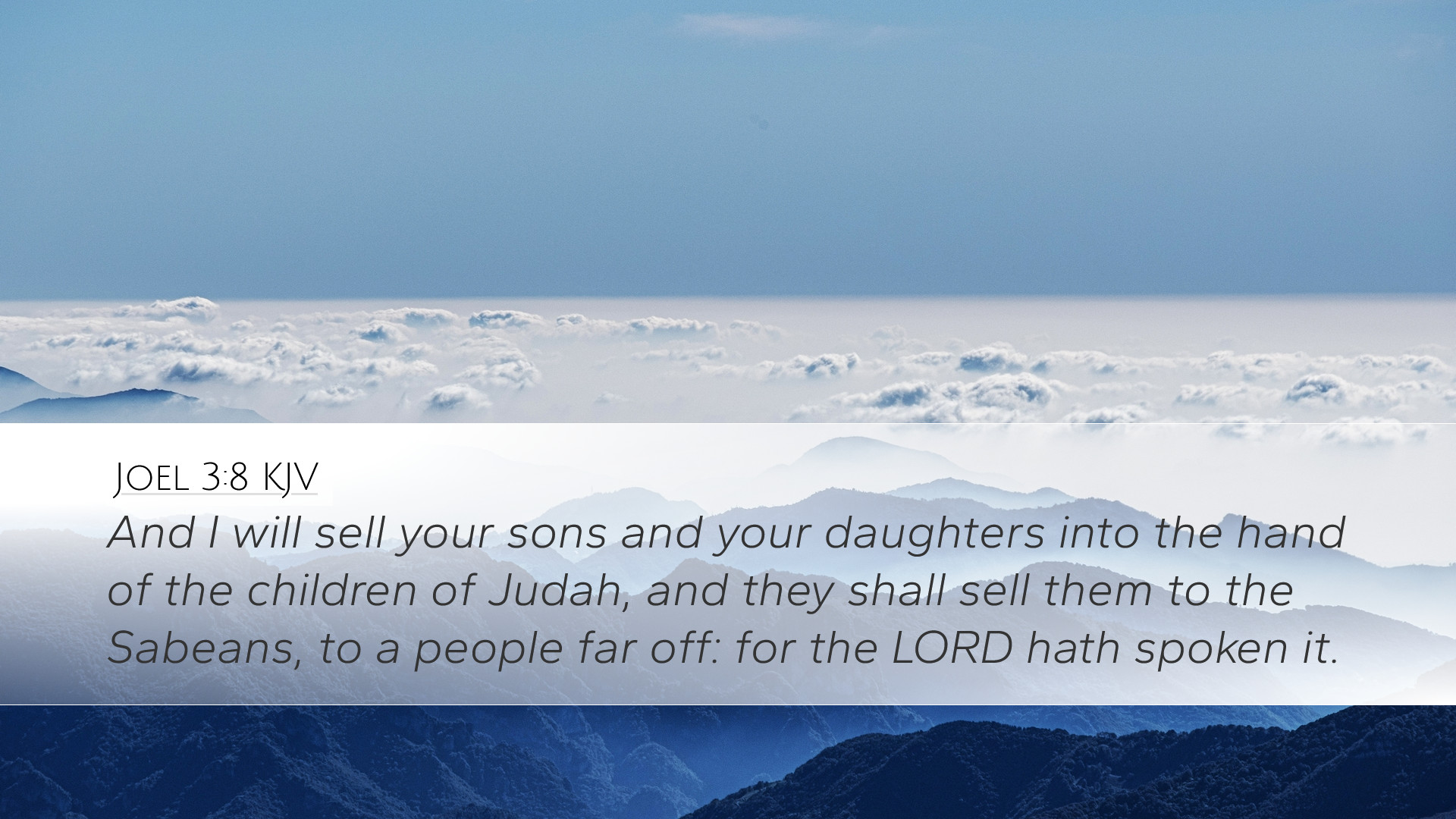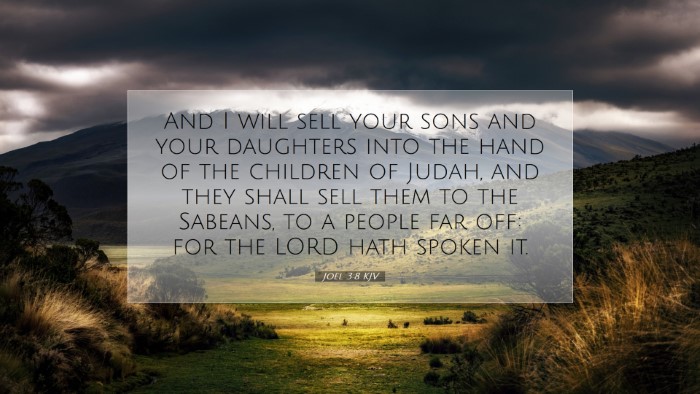Old Testament
Genesis Exodus Leviticus Numbers Deuteronomy Joshua Judges Ruth 1 Samuel 2 Samuel 1 Kings 2 Kings 1 Chronicles 2 Chronicles Ezra Nehemiah Esther Job Psalms Proverbs Ecclesiastes Song of Solomon Isaiah Jeremiah Lamentations Ezekiel Daniel Hosea Joel Amos Obadiah Jonah Micah Nahum Habakkuk Zephaniah Haggai Zechariah MalachiJoel 3:8
Joel 3:8 KJV
And I will sell your sons and your daughters into the hand of the children of Judah, and they shall sell them to the Sabeans, to a people far off: for the LORD hath spoken it.
Joel 3:8 Bible Commentary
Commentary on Joel 3:8
Joel 3:8 states:
"And I will sell your sons and your daughters into the hand of the children of Judah, and they shall sell them to the Sabeans, to a people far off: for the LORD hath spoken it."
Contextual Overview
This prophetic book presents a call to repentance in the face of impending judgment, setting the stage for God's restoration. The verse in question falls within a larger conversation regarding the fate of nations and the consequences of their actions against Israel.
Scholarly Interpretations
Matthew Henry's Commentary
Matthew Henry emphasizes the nature of divine justice and the severe consequences that befall nations in opposition to God’s chosen people. He notes that the phrase “I will sell your sons and your daughters” symbolizes the complete subjugation and loss of freedom that will occur as a result of their transgressions. Judah, representing the righteous, will reclaim what is taken, indicating a reversal of fortunes between oppressors and the oppressed.
Albert Barnes' Notes
Albert Barnes points out that God declares a promise of retribution. He suggests that God will sell the captors’ children, not just as a means of revenge but as a fulfillment of covenant justice. The 'children of Judah' signify revival and restoration, being instruments in God’s hand to execute His judgment against the wrongdoers. Barnes also notes that the Sabeans, a distant people known for their trade, represent those who are mercenary in their ambitions, reinforcing the idea that nations turn against one another ultimately due to greed and moral decay.
Adam Clarke's Commentary
Adam Clarke delves into the historical background of the nations referred to in this verse. He suggests that the children of Israel face suffering at the hands of the pagans, represented here by the Sabeans, who were engaged in extensive trade and plunder. Clarke illustrates that this foretells the widespread judgement of nations and how divine justice will prevail over injustice. He emphasizes the moral lessons to be learned—that nations must not only seek their own welfare but consider the implications of their actions upon others, aligning with God’s ultimate justice.
Theological Implications
This verse illustrates significant aspects of divine sovereignty, mercy, and judgment. The simple assertion “for the LORD hath spoken it” affirms that God's word holds ultimate authority, impacting the existential realities of nations. Below are key theological implications:
- Divine Sovereignty: God exercises control over the destiny of nations, demonstrating that human rebellion has moral and spiritual repercussions.
- Justice and Retribution: The actions of nations against Israel invite divine retribution, where wrongdoings must be accounted for, stressing the nature of God's justice.
- Hope and Restoration: Within judgment lies the promise of restoration, indicating God’s intention to bring His people back from desolation.
- Interconnectedness of Humanity: The interactions between Judah and the Sabeans symbolize how nations influence one another, suggesting that the suffering of one can lead to the downfall of another.
Practical Applications
For contemporary believers and leaders, applying the warnings and promises embedded in Joel 3:8 is crucial for spiritual discernment and communal integrity. They include:
- Sensitivity to Justice: The church must advocate for justice and righteousness, aware of the social dynamics that impact individuals and nations.
- Call to Repentance: Understanding the dire consequences of disobedience encourages a continual call to repentance and humility before God.
- Hope in God’s Restoration: Believers should hold onto the promise that despite judgment, God desires to restore and heal His people, inspiring hope in all circumstances.
- Awareness of Global Interactions: The interconnected nature of societies today reflects the historical truths expressed in scripture; believers must engage in ethical relationships that promote peace and justice globally.
Conclusion
Joel 3:8 serves as a profound reminder of the serious nature of God’s judgment against nations that oppress His people. By understanding the historical, theological, and practical implications of this verse, pastors, students, and scholars are equipped to grasp the fullness of God's sovereignty and righteousness in a world often marked by injustice and strife.


